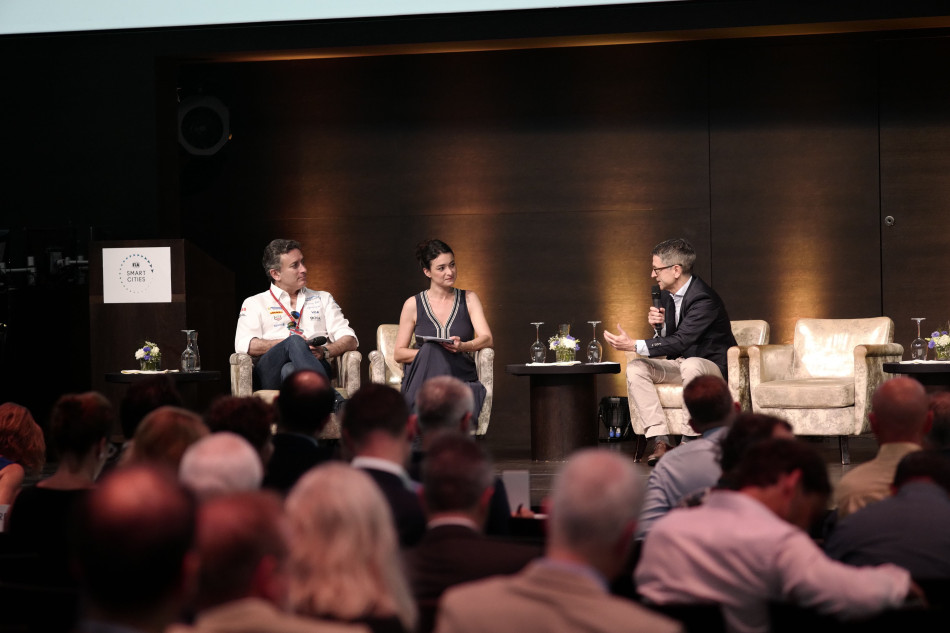Smart Data to shape the cities of tomorrow: FIA Smart Cities Forum in Zurich concludes the second season of high-level conferences on urban mobility challenges
Yesterday, the last Forum of the second season of the FIA Smart Cities initiative took place in Zurich after a day of cross-sector discussions on the key role Smart Data can play in defining the future of urban mobility.

Smart Data, technological development and improved mobility are closely linked to each other. Indeed, a better use of data fosters the success of new mobility technologies allowing people to move in a cleaner and safer way. During the opening ceremony of the Forum, Peter Goetschi, President of the Touring Club Suisse, talking on stage alongside Alejandro Agag, CEO of Formula E Holdings, pointed out the challenge of convincing road users to change their habits in a rapidly evolving mobility landscape. "It is essential to show the public that technology can and will revolutionise the future of urban mobility. Raising awareness and demonstrating the benefits of new mobility solutions must be a shared goal for cities and key mobility stakeholders", he said.
This vision was further developed by two keynote speakers. The first speaker was David Zipper, Resident Fellow of the Urban and Regional Policy Program of the German Marshall Fund, who talked about how data flows can optimise public-private cooperation. "Data architecture should be accurately designed and enforced to ensure that new mobility services meet user demand," he stated. The necessity of efficient data management to ensure technologies comply with evolving user mobility needs was further highlighted by Karen Vancluysen, Secretary General of Polis. In her keynote speech, she explained how data can build efficient policy-making. "Innovation strategy should be complimentary to the policy goals of the city. A collaborative vision is what can foster a gradual transition to an “open-data” system", she said.
The panel discussion of the Forum gathered Norbert Rücker, Head Macro and Commodities Research at Julius Bär, Philippe Crist, Administrator and Project Manager at the International Transport Forum (ITF), Rami-Johan Joleka, Head of Digitalization at ABB, Marc Langenbrinck, CEO of Mercedes-Benz Switzerland, and John Zanni, President of Acronis, to discuss the means to unlock the digital future of Smart Cities. Mr Zanni reminded the role smart data and data protection will play in that process, focusing on data-driven technologies in the sector of urban transportation. Mr Joleka, from ABB, pointed to the growing importance of digital economy, explaining how ABB contributes to the “open-data” system by implementing efficient digital solutionsacross all critical sectors.The panelists stated that data are critical to build the digital infrastructures to manage new urban mobility services in an efficient way. They added that real-time data collected by private mobility operators represent a unique tool that public authorities should have access to in order to define demand-driven policies. Philippe Crist from the ITF highlighted the new challenge policy-makers are facing. "There is a shift in from the public sector, that used to have a lot of data, to the private sector, that now generates a lot of data. How to create a trusted exchange of information between the public and the private sectors is going to be a key challenge for governments around the world." Norbert Rücker from Julius Bär further commented by underlining the desire of both users and local authorities to support a better use of data. "There is a clear user willingness to share data in order to then benefit from more efficient transport services. Similarly, cities implement open-data policies when such enhance the overall performance of transport networks", he said. The conclusion of the panel was that when designing data-related policies, the objective should be to create regulatory conditions that help cities become smart, resilient and interconnected.
Another highlight of the Forum was the focus discussion with Nathan Borgford-Parnell, Science Affairs Officer at the Climate and Clean Air Coalition of the United Nations Environment Programme (UNEP). Mr Borgford-Parnell explained why smart mobility and sustainability are intertwined. With its commitment to a low-carbon future, the UNEP encourages cities to adopt sustainable innovations that can make urban mobility less polluting, more user-oriented and safer.
Innovative solutions being at the heart of the Smart Cities ecosystem, the Forum was also the occasion to give the floor to visionary start-ups in the field of urban mobility. After the pitches on stage, Parquery was announced as the winner of the Zurich edition of the FIA Smart Cities Global Start-Up Contest. Providing real-time parking occupancy information thanks to cameras and computer vision software, Parquery has developed a Smart Parking solution requiring minimal infrastructure to address one of the most important challenges cities are facing.
Innovation was also the focus of Formula E star Sebastien Buemi's interview. Ahead of the first E-Prix to take place in Zurich, he talked about the transfer of technology from the track to the road and underlined the catalyst role that electric racing brought in the heart of cities is playing in the promotion of e-mobility.
The Forum concluded with on-track experiences and an exclusive opportunity to see innovation in motion when participants were invited to visit the FIA Formula E garages before watching the FIA Formula E Shakedown.

 Facebook
Facebook Twitter
Twitter






